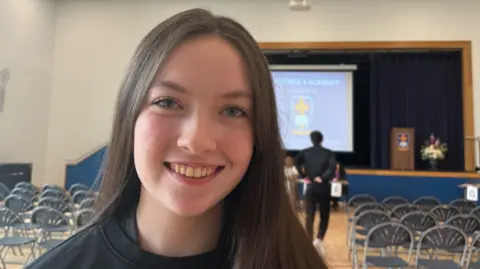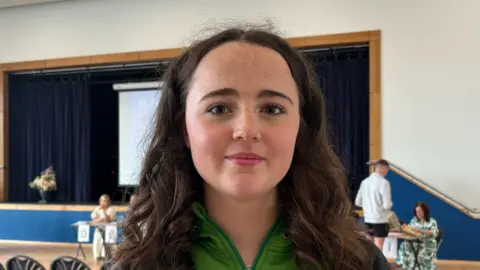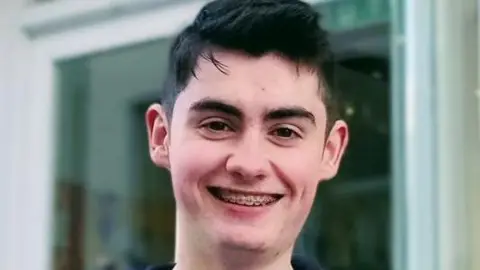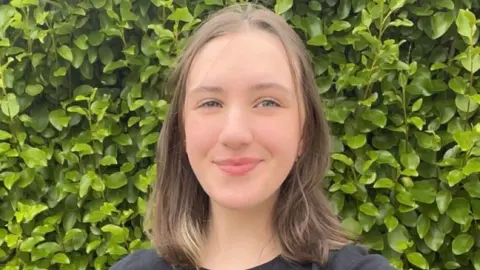


 Getty Images
Getty ImagesThere has been a fall in the percentage of people receiving top GCSE grades in Northern Ireland in 2024 compared to last year.
About 31% of students achieved grade A and above, compared to the pre-pandemic levels of 30.5% in 2019.
Grades A* and A were awarded to about 34.5% of GCSE entries in 2023.
Entries for GCSE qualifications have also increased by 4.4% from 168,118 in 2023 to 175,555.
The Joint Council for Qualifications said that 82.7% of students received grades of C and above, “similar to the 82.2% awarded in 2019”.
Some 86% of GCSE entries in Northern Ireland were awarded grade C or above in 2023 and 90% in 2022.

It’s been a good start to the day for Calla from St Patrick’s Academy in Dungannon.
She achieved 10A*s in her GCSEs.
“I was a bit nervous driving in but I definitely feel better now”, she told BBC News NI.
Calla said she would like to do Biology, Chemistry, Maths and Irish at A-level.
“I haven’t decided which Uni I’d go to but I’m thinking of doing medicine.”

St Patrick’s Academy pupil Helena said she was “very nervous” and “very happy” after finding out her GCSE results.
She got 6A*s and 4As and hopes to study Chemistry, Physics and Software Development at A-level.
GCSE, AS and A-level exams were cancelled in 2020 and 2021 due to Covid-19 pandemic restrictions and pupils were awarded grades calculated by their schools instead.
In subsequent years, pupils have been given assistance including having advance information released about exam topics.
That had led to an increase in the number of top grades awarded, but GCSE results this year are likely to be similar to those in 2019.
BBC News NI spoke with some students in Northern Ireland ahead of receiving their results earlier this week.
 Senan
SenanSixteen-year-old Senan from St Malachy’s College in Belfast is a keen musician and has already achieved an A* in GCSE Music which he took two years early.
“I had to do a performance, a composition and finally a written exam, listening to music and critiquing and evaluating,” he told BBC News NI.
“The music teachers were always brilliant and really supportive and have helped me a lot to get to where I am now.”
Apart from music, he also enjoys languages and maths, and is quietly confident about his results.
“I think they went alright; I tried my hardest and I can only hope for good results. I’m hoping for maybe As and Bs.”
He said the hardest thing about his GCSEs was time management.
“GSCEs really set you up and teach you a lot about time management and commitment; those real-life skills,” he said.
 Ariana
ArianaAriana, from Parkhall Integrated College in Antrim, said she was “feeling a wee bit nervous” about her results.
“I know I possibly didn’t do the best I could’ve done at the time,” she said.
“I found the exam process difficult and especially having to settle into an exam routine.
“I found that I was quite burnt out by the end.
“My school were able to put in accommodations for me so I have hope, but I am not sure I’ve done the best I could have.”
Ariana wants to study politics, history and English literature at A-level and someday hopes to be a politician or a teacher.
“I am not going to put myself down if I have not done well,” she says.
“There is no point.”
“I am happy for those with top marks but people need to consider whatever circumstances they were in at the time.
“I am not going to compare myself to other people because I know my brain works differently and I excel in things other people do not.”
 Daisy
DaisyDaisy, from Royal School Armagh, would like to study either law or physiotherapy in the future.
She said: “I have been keeping myself busy throughout summer but sometimes you just randomly remember you have to get these results right before you go to school.
“It’s nerve-racking not knowing for a whole summer and having to wait until the very end.”
Her message for other pupils was: “There is no point being nervous because you can’t change what is in that paper.
“Hopefully all your hard work has paid off and you got enough to do what you want to do, and if you don’t get back into sixth form, there are other options.”
 Ciara
Ciara Ciara, from Our Lady and St Patrick’s College Knock, in Belfast, will also get her grades on Thursday.
Among her subjects she studied maths, biology, Irish, history and geography.
“I think I am aiming for As, because it will be much easier to go from GCSE to A-level with As,” she said.
“As long as my hard work is reflected in my grades, I’ll be happy.”
In the future, Ciara hopes to “do something that mixes biology and geography – either something to do with environmental science or earth and ocean sciences”.
But Ciara said that it was hard to choose what to do at such an early age.
She has coped with the wait for results by trying to spend as much time with her friends as possible.
“When we spend time together it is a relief of stress,” she said.
“I’ve tried my best to enjoy the break despite it looming over us, I’d hate to go back in September having wasted my summer worrying.”
“Everyone is very supportive and there is a good sense of community because the teachers are rooting for you.”
The vast majority of GCSEs in Northern Ireland are taken by pupils through CCEA.
The remainder are taken through English and Welsh exam boards, so some pupils in Northern Ireland will receive results in the form of numbers as well as letters.
That is because GCSEs in England are graded numerically from 9 to 1.
Pupils use their GCSE and results of other qualifications like BTECs to progress to A-levels, courses in Further Education, training or employment.
Richard Kirk, the CEO of Workplus told Good Morning Ulster that the “snobbery around apprenticeships is definitely diminishing but we need more employers to get involved.”
Workplus is an organisation that links employers with would-be apprentices.
After her GCSE’S, Ella decided to do a traineeship with South West College Enniskillen in Light Vehicle Apprentice.
“I absolutely love it”, she told BBC programme Good Morning Ulster.
“I choose to do it because school was very book based and that didn’t really suit me. I’m more of a hands on person and find it easier to learn something if I’m actually doing it.”
 Jack Neill
Jack NeillJack was an Construction Engineering apprentice at the Northern Region College, Coleraine.
With a BTEC Level 3 Diploma and foundation degree under his belt, he is now doing an honour’s degree in Construction Engineering and Management.
“There was a stigma. I was never a fan of exams so I never really had the desire to do A-levels. I always had an interest in the construction industry.”